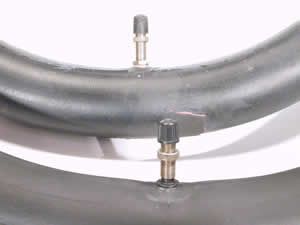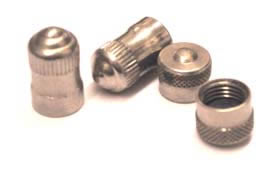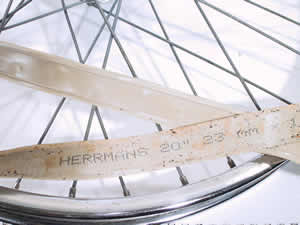|
Nit
Picker’s guide to inner tubes
Yes, I know, Tyre Inner tubes
are hardly the first thing that people look at when considering
a Raleigh Chopper, but If you are going to be period perfect, the
right inner tubes can make or break that restoration project. That
last sentence may be a tad misleading, however, because the correct
inner tubes for early bikes are no longer produced. Nevertheless,
the differences are worth knowing, and it adds one more thing to
your search list. The chances of finding n.o.s. early style inner
tubes in good condition is non existent, but it’s the hunt
that is the most fun, not the result.
Anyway, just what IS so special about early inner tubes?
The Raleigh Chopper was released as the first production bicycle
to have car style tyre valves. This advertising slogan was obviously
untrue, the whole Moulton and R.S.W. (Raleigh Small Wheel) range
of cycles had been using car style valves for years in the U.K.
A minor fact like that didn’t deter our friends in the Raleigh
advertising department.
The early (up to 1975???? ) Raleigh Choppers came from the factory
with metal valves on the inner tubes, not the more common rubber
valves. Inner tubes from Michelin, Semperit and Raleigh’s own
brand were fitted to Choppers. The valves were made of metal, with
the thread going right down to the base of them.
Here is a picture of two brands of inner tube showing slight differences
in the valve style.

All Mark 1, Sprint , Mark
2 five speed and regular Mark 2 bikes had metal tube valves until
the middle of the decade. This means that all American bikes would
have had metal valves.
The Special Edition of 1976 had rubber valve stems because its aluminium
wheels weren’t suitable for metal valves. Around this time,
the metal valved inner tubes were phased out on the Chopper range.
The metal valves lived on until the turn of the 1980`s on some of
the R.S.W. range of bicycles, but not the Choppers.
The metal valve stems had a thin locking ring that was screwed down
the valve stem once it was fitted through the wheel, and had plastic
black valve caps. As metal valve caps were available to both the
car and cycle market in the 1970`s, it is quite acceptable to fit
these to Chopper bikes. Correct period metal valve caps often had
their makers name printed around the rim, Schraeder being the most
sought after, and in my opinion, the most period correct. Metal
valve caps can of course be fitted to inner tubes with rubber valves.

The later inner
tubes had black rubber valve stems, and perfect replacement rubber
valved inner tubes are still manufactured in the correct sizes for
Raleigh Choppers. Raleigh branded inner tubes are no longer made,
but any manufacturer would be acceptable. It is perfectly acceptable
to retro fit rubber valved inner tubes to any era Chopper bike,
as fitting 30 year old metal valved items is not a good idea if
you are to ride the bike. Of course, if you are building a museum
quality show bike, re-chromed metal valve stems would be expected.
For this application, I would recommend finding some period inner
tubes that have a locking ring under the wheel rim, as well as outside,
these type can have the valve stem removed from the inner tube,
it is best to cut the old rubber away, and after re-chroming, they
can be bolted into modern inner tubes. Tubes built like this will
hold air acceptably, but I wouldn’t recommend riding the bike!
Inside the tyre, there was also the Rim Protector Tape. This is
the large rubber band that covers the spoke ends inside the wheel,
and stops them puncturing the inner tube. The rim protector tape,
in fact protects the inner tube, not the rim.
All Raleigh wheels were built at the factory with slightly over
length spokes, this meant that after the wheel was built, and trued
up, a tiny bit of spoke protruded through the spoke nipple, into
the inner tube area, this was ground off at the factory, the top
of the nipples also was often ground down.

The roughness of the nipple
tops could puncture the inner tube, so the Rim Protector Tape was
used. On Raleigh Chopper bikes this tape was always off white in
colour, and made from a very plasticy style of rubber. They were
made by the Herrmans company in Germany. Modern versions of these tapes are
available, if your existing ones are unserviceable. I have often
seen off white versions still available for the twenty inch rear
wheel, but have never seen sixteen inch fronts. As they ere invisible
in fitment, black ones would be acceptable if no whites were found.

There, for something that
is completely invisible in use, we’ve managed to fill a page
talking about them!
|





